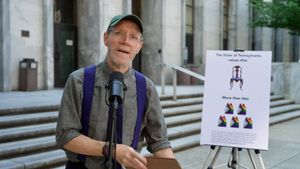The most divisive
issue in American Protestantism will move to the
forefront again this week as the 4.9 million-member
Evangelical Lutheran Church in America takes a key
vote on what role gays should have in the
denomination.
About 1,000
church members will meet beginning Monday in Orlando,
Fla.,where they'll decide whether to ordain gays who are not
celibate and whether to bless same-sex unions.
No split is
imminent. Conservative Lutherans have planned a November
meeting to consider forming an association of like-minded
churches--but within the ELCA.
Still, few
Lutherans believe church members can reconcile their
conflicting views of what the Bible says about
homosexuality, and tensions rooted in years of
wrangling over the issue are expected to spill over at
the Churchwide Assembly, which runs through next Sunday.
Presiding bishop
Mark Hanson, head of the Chicago-based denomination,
expressed hope that the church would stay unified despite
these differences. "I don't look to a tension-free
church as the mark of a vital and healthy church in
mission," Hanson said in a recent conference call with
reporters. "I think, as a large church body, we have
great capacity to be in mission together that is diminished
when we are apart."
Turmoil over
homosexuality in other Protestant churches is expected to
influence the Lutheran vote. The starkest example is the
Episcopal Church, which set off a crisis among fellow
members of the Anglican Communion by confirming its
first openly gay bishop--V. Gene Robinson of New
Hampshire--two years ago. Anglicans worldwide are now
struggling to remain unified.
Another concern
is whether a change in Lutheran policy would affect
relations with other Christian groups and within the
Lutheran World Federation, which represents 138
churches in 77 countries. Members of the association,
which Hanson also leads, differ on gay issues.
The key proposals
before the Orlando assembly are based on years of work
by a denominational task force on sexuality that tried to
find a compromise policy.
The measures
would:
- Affirm the
church ban on ordaining sexually active gays, but allow
bishops and church districts, called synods, to seek an
exception for a particular candidate if that person is
in a committed relationship and meets other
conditions.
- Uphold the
denomination's prohibition against same-sex blessings, but
give bishops and pastors discretion in deciding how to
minister to gay couples.
- Call for unity,
even though congregants disagree on the issue.
Despite this
attempt to find a middle ground, the task force proposals
failed to win support from Lutheran groups most active in
the gay debate. Those on opposing sides plan,
separately, to lobby against the measures on church
policy.
The Reverend Roy
Harrisville, of the conservative Solid Rock Lutherans,
called the proposals "foolish." He and other conservatives
said the changes, if adopted, would essentially
overturn the ban on ordaining gays without explicitly
saying so. "They recommended they have a rule and not
enforce it. Well, that's just silly," Harrisville said.
The Reverend Jeff
Johnson of Goodsoil, a coalition of Lutheran groups
advocating full inclusion of gays, said the proposals would
create a second-class roster of gay clergy that would
be unjust. Goodsoil members will urge voters to
abolish the ban outright.
"Gay and lesbian
pastors want to be treated like other pastors and not
run through a separate regime that will prove itself to be
discriminatory," Johnson said.
The WordAlone
Network of conservative churches says its research has
found the majority of Lutherans hold traditional views of
the Bible. Yet Johnson is convinced the ELCA will
eventually approve ordaining gays. "It is clear to me
that the trajectory among Lutherans is for inclusion
and nondiscrimination, and that is where our church is
headed," Johnson said.
Karl Donfried, a
religion and Bible scholar at Smith College who is an
ELCA pastor, emphasized that Lutherans elected to attend the
assembly will be voting their conscience, not
necessarily reflecting the views of their church
district, making it difficult to speculate about the vote.
"What happens in Orlando could take on its own momentum,"
said Donfried, who joined other conservative
theologians in issuing a statement critical of the
task force proposals.
Last month, the
Evangelical Lutheran Church in Canada voted against
allowing local pastors to decide whether to bless same-sex
couples. The other major U.S. Lutheran body, the
Lutheran Church-Missouri Synod, is staunchly
conservative on gay issues. (AP)














































































